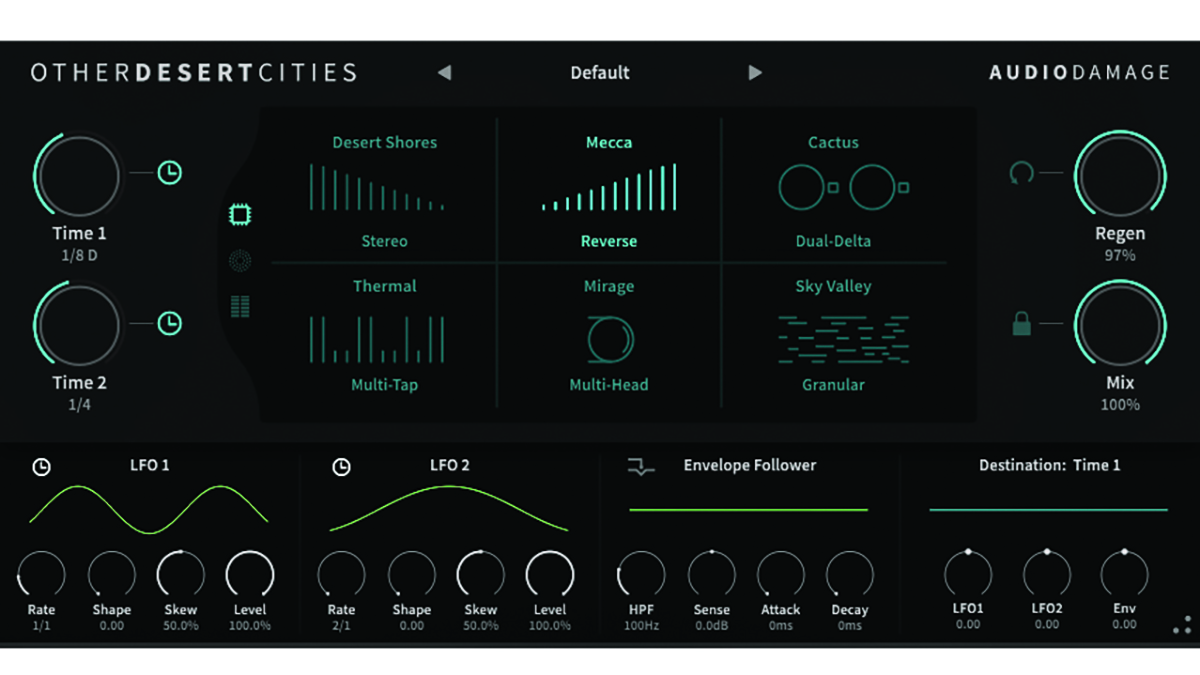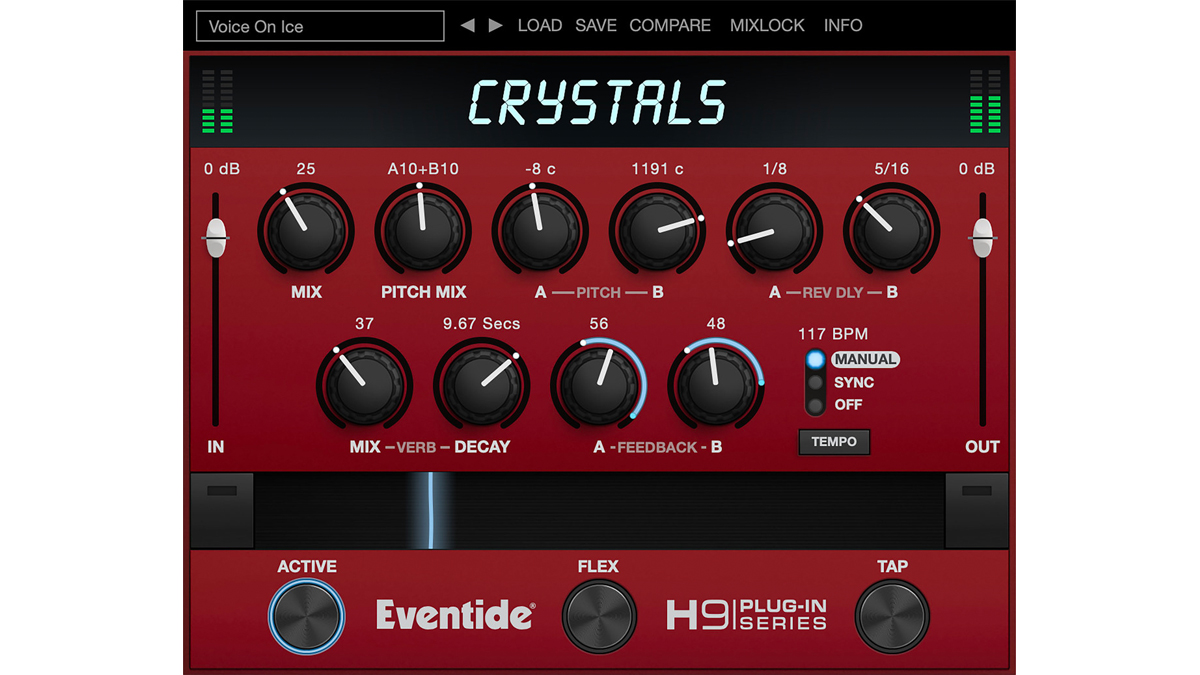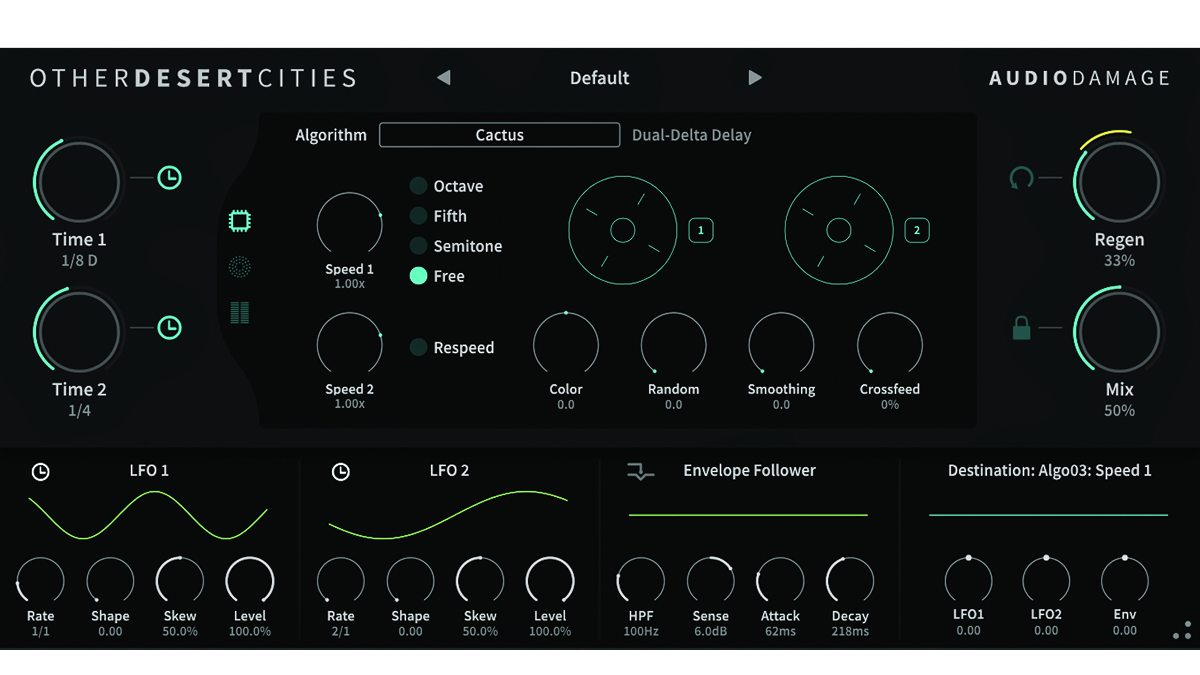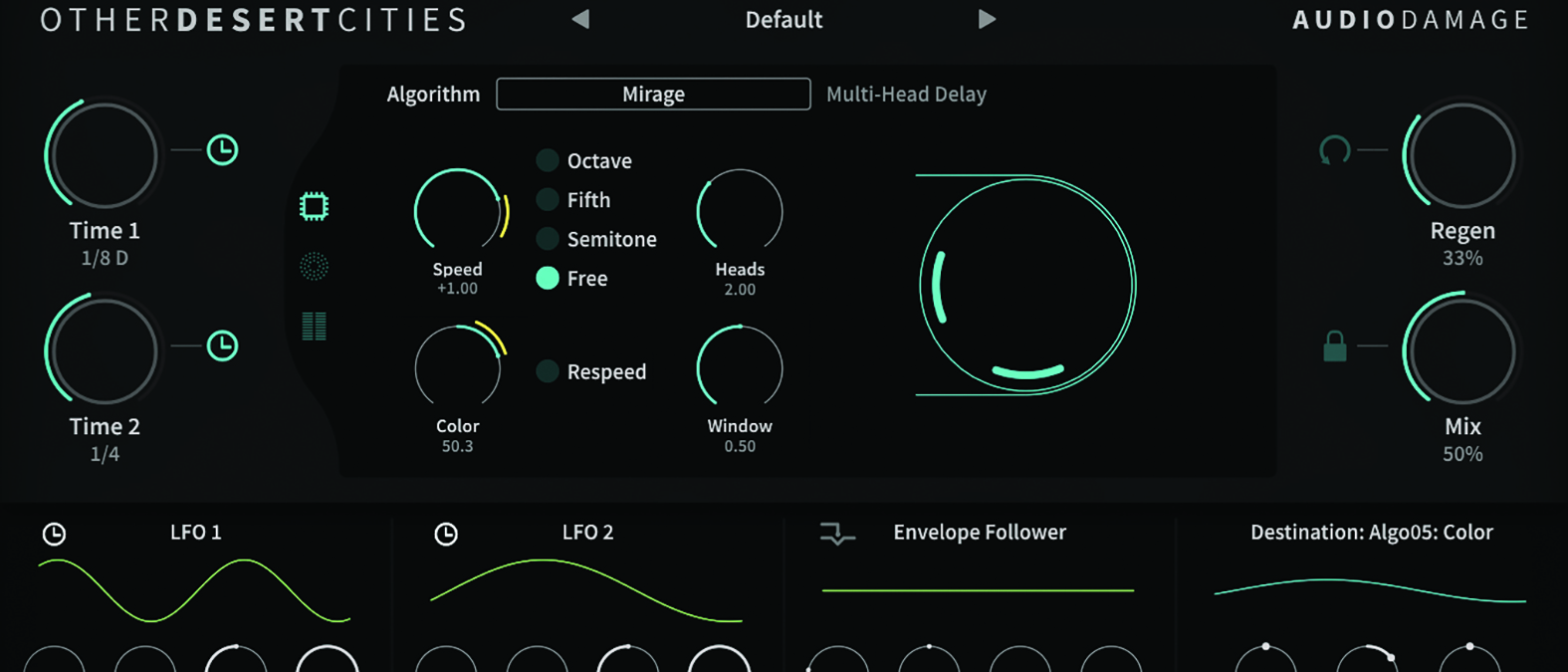MusicRadar Verdict
Despite its cryptic branding, Other Desert Cities is a unique and fine delay plugin, that could easily replace two or three plugins from your existing workflow chain.
Pros
- +
Exceptionally cool-sounding delays.
- +
Six unique and creative delay algorithms.
- +
Modulation routing is simple.
- +
It’s something of a bargain, at this price!
Cons
- -
The GUI is a bit ‘monochrome’.
MusicRadar's got your back
Audio Damage Other Desert Cities: What is it?
- Windows: 8.1 or newer and a 64-bit DAW. VST, VST3, AAX CLAP 64-bit.
- Mac: Universal Binary 2 for Intel/M1 macOS 10.12 or newer and a 64-bit DAW. VST, VST3, AAX, AudioUnit, CLAP 64-bit.
- Buy at Plugin Boutique
Audio Damage could be regarded as the epitome of a contemporary and evolving company; it once produced a highly regarded line of Eurorack modules, alongside a clutch of equally respected plugins. More recently, there’s been a greater shift toward software, but Audio Damage’s move is coupled with considerable support for Ubuntu and iOS, alongside the more usual OSX and Windows versions. Moreover, the quality of the software is better than ever.
Residing within their portfolio of effects and instruments, Other Desert Cities (aka AD054) is a curious and engaging effect plugin, which is centred around delay. Named after an apparently famous road sign, on the Interstate-10 highway as you leave LA, this plugin utilises six algorithms, which provide everything from regular stereo and multi-tap delays, through to evolving granular and pitch-shifting colours.

Audio Damage Other Desert Cities: Performance and verdict
Beginning our explorations through the use of a basic piano sample, the opening default is a highly respectable stereo delay, which bounces left, right and centre, as stereo delays do. Nothing unusual about this, but it’s important to note that even at this most basic level, there is plenty of control. The Regen pot immediately affects the timing of the delay dissipation, and if you’re into your minimalism-style cross rhythms, you can set the control to a full 100% and play along for hours.

• Eventide Crystals
A plugin inspired by the H3000 Harmonizer, which allows cascading pitch effects with delays.
• Fabfilter Timeless 3
A great cross-section of vintage and creative delays, as well as a heap of modulation possibilities.
There’s a helpful visual aspect to this plugin, thanks to the central display which guides the use of each algorithm. In the case of the initial stereo delay, adjusting the Regen control results in a visual reflection, as the decay slopes off into the distance. This basic algorithm is named Desert Shores, but clicking the Algorithm menu invites selection of the other five algorithm offerings. Mecca is the next to treat our piano, providing similarities to the initial salvo, but as a reverse-style delay.
Each algorithm benefits from immediately accessible controls related to each of the delay styles. These appear immediately alongside the algorithm graphic, and extend from the more usual and basic, such as high and low cut, to the more innovative, depending on the chosen algorithm at work.
Getting a little more adventurous, we move to the Cactus algorithm, which is a multi-head delay, much like a tape delay. Appropriate then, that the graphic switches to a form of swirling tape capstan. It can be the most basic settings that bring the most pleasure, and the speed control within this algorithm allows for slowing and even reversing of tape, all with alarming precision. The ability to automate this function within the DAW is simply too tempting!
Sky Valley is the algorithm based around Granular Control. Keeping with our piano for the moment, chaos is only a few pot-tweaks away. ODC makes incredibly light work of granular application, with the ability to divide the signal into assignable grain sizes, while scattering them across the stereo image with a healthy amount of pitch-shifting thrown in for good measure. Apply this in lesser amounts to an evolving pad and the outputted granular colours are hugely impressive.
Want all the hottest music and gear news, reviews, deals, features and more, direct to your inbox? Sign up here.
It’s the ease with which you can apply these elements that is appealing, through an interface which is easy to edit and invites experimentation; although, that being said, the great preset content definitely provides immediate inspiration.

On-board modulation
One of the most important elements to be found within Other Desert Cities is also one of the easiest to use. ODC is packed to the brim with modulation possibilities, thanks to an ingenious and simple-to-use routing system, which allows the use of two separate LFOs and an Envelope follower, to control just about any parameter on the plugin. As you experiment by clicking and altering pot values, the last pot you have selected immediately appears in the destination dialogue, on the bottom right-hand-side of the plugin. This means that you can apply the modulation immediately and easily as you work.
Audio Damage has performed a master stroke here by doing away with a modulation matrix, or the ubiquitous dangling virtual cables that we are familiar with elsewhere. Having the option to automate controls, or route/sync elements such as LFOs to your DAW, provides a level of creative flexibility which is by no means unique, but it is incredibly easy to use and adapt.
Verdict
As a basic delay, it is a very good alternative to anything you will find in your DAW, but for sheer delay-based experimentation, ODC goes a very long way. If you like the idea of delays on steroids, it doesn’t come more pumped-up than this
MusicRadar verdict: Despite its cryptic branding, Other Desert Cities is a unique and fine delay plugin, that could easily replace two or three plugins from your existing workflow chain.
Audio Damage Other Desert Cities: The web says
"Other Desert Cities takes on the audio delay world with gusto and imagination, and manages to balance sophisticated and other‑worldly effects with a clean and easy‑to‑use interface."
Sound On Sound
Audio Damage Other Desert Cities: Hands-on demos
Red Means Recording
Integraudio
The Sound Test Room
Audio Damage Other Desert Cities: Specifications
- Windows: 8.1 or newer and a 64-bit DAW. VST, VST3, AAX CLAP 64-bit.
- Mac: Universal Binary 2 for Intel/M1 macOS 10.12 or newer and a 64-bit DAW. VST, VST3, AAX, AudioUnit, CLAP 64-bit.
- iOS 11, iPadOS 13 or newer and a separate purchase, available soon in the App Store. AUv3 64-bit. IAA & Standalone 64-bit.
- Ubuntu 18 or newer and a 64-bit DAW. VST, VST3, CLAP 64-bit.
- CONTACT: Audio Damage
Computer Music magazine is the world’s best selling publication dedicated solely to making great music with your Mac or PC computer. Each issue it brings its lucky readers the best in cutting-edge tutorials, need-to-know, expert software reviews and even all the tools you actually need to make great music today, courtesy of our legendary CM Plugin Suite.

